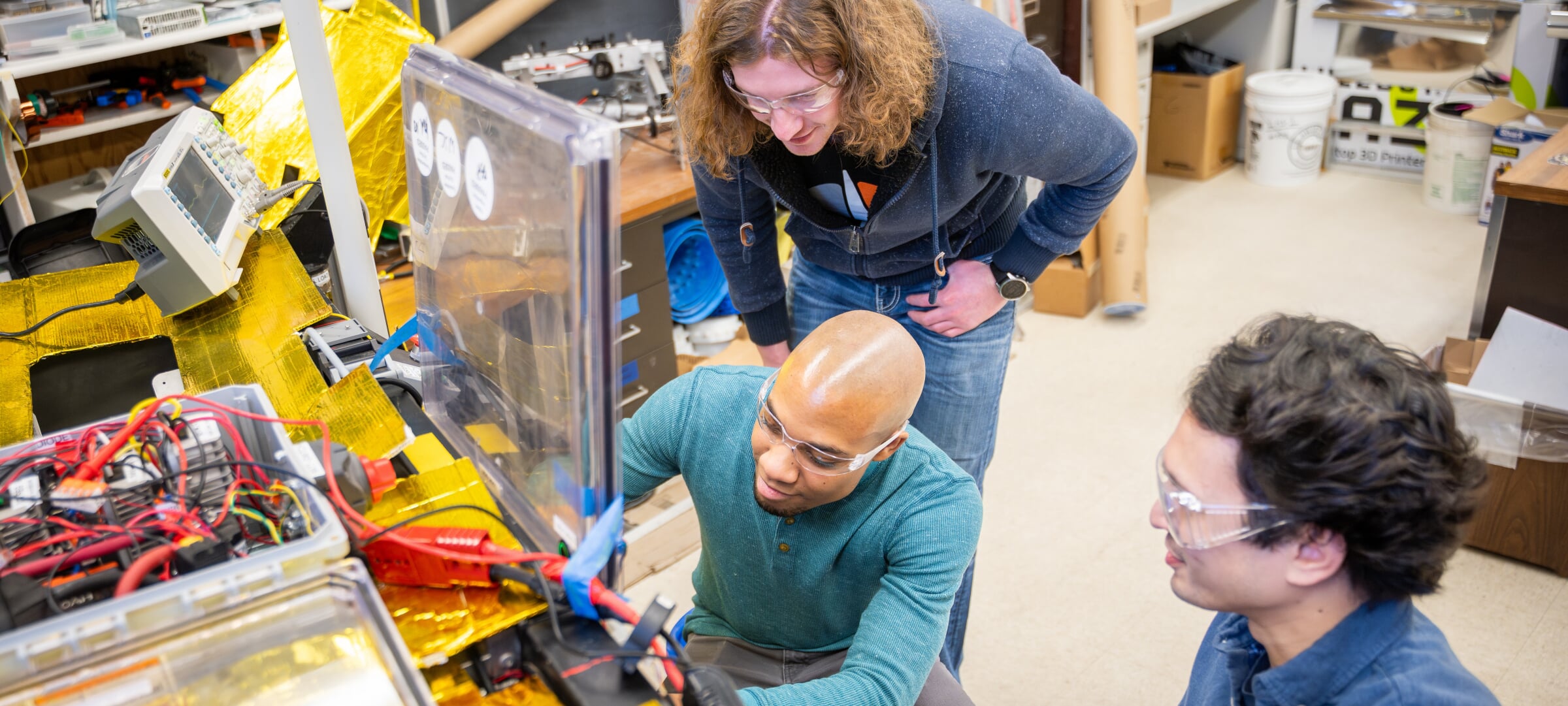Commercialization is driving aerospace expansion across the nation and in Michigan. Pursue your career in aerospace engineering at Michigan Tech Aerospace engineering graduates can go into avionics, astronautics, aircraft or spacecraft design, flight test engineering—the possibilities are as limitless as space itself.
Aerospace engineers design, develop, and test aircraft, spacecraft, and related systems by using principles of mechanical engineering, materials science, and physics to create designs that meet performance and safety requirements. They also work on improving existing designs, and are involved in the production, testing, and maintenance of aircraft and spacecraft. Some engineers specialize in specific areas, such as propulsion systems, structural design, or control systems.
Studying Aerospace Engineering
Want to know how to become an aerospace engineer? Michigan Tech offers abundant opportunities for students interested in joining this in-demand profession, including our bachelor's degree in aerospace engineering. Our students work on real-world aerospace projects for major aviation companies such as NASA, the US Department of Defense, and GE Aviation Systems.
Request Information
Form loading . . .
Students who don't major in aerospace engineering can focus on developing their expertise in a discipline that they can apply to aerospace projects. This approach can help students meet the needs of employers who are looking for engineering graduates with specialized skills in their respective who can contribute to innovation in the aerospace industry.
Degree Programs
First, choose a major that can be applied to aerospace engineering and suits your own unique interests. Undergraduate degree programs commonly chosen include:
- Aerospace Engineering (BS)
- Mechanical Engineering (BS)
- Materials Science and Engineering (BS)
- Electrical Engineering (BS)
- Computer Science (BS)
- Software Engineering (BS)
Then, add an aerospace minor:
- Aerospace Engineering (Minor)
Our aerospace engineering minor prepares you to work on any aerospace engineering project. - Aerospace Studies (Minor)
Our aerospace studies minor prepares you to work specifically on military aerospace projects.
Get Involved with Aerospace Engineering
There are lots of ways for students to be involved in aerospace engineering at Michigan Tech:
Enterprise
Aerospace Enterprise
The Aerospace Enterprise at Michigan Tech provides hands-on aerospace education and experience to undergraduate students. The team works together on innovative aerospace projects for real clients (including NASA and the Air Force Research Laboratory), with all members contributing toward specific project goals.
Aerospace Enterprise places an emphasis on space mission design and analysis, vehicle integration, systems engineering, and comprehensive ground testing and qualification.
The Oculus-ASR Microsatellite, one of the team's recent spacecraft projects, was launched aboard a SpaceX Falcon Heavy in 2019 to serve as an imaging calibration target for ground-based observatories tasked with characterizing spacecraft.
Multiplanetary INnovation Enterprise (MINE)
The Multiplanetary INnovation Enterprise (MINE) guides students through three hands-on projects:
- NASA Lunabotics competition
- a trencher research team for testing excavation in our vacuum chamber
- an underwater mine mapping robot
AEronautics and Rocketry Enterprise (AERE)
The AEronautics and Rocketry Enterprise (AERE) team explores aerospace through experiential learning by:
- competing on a global stage
- hands-on experience in propulsion, flight systems, and rocketry
- interdisciplinary collaboration
- opportunities to design, build, and test rockets, aircraft, and propulsion systems
- innovative research in liquid propulsion
Senior Design
Senior Design at Michigan Tech is more than just an assignment to finalize your engineering degree. Connect with industry through real industrial projects and gain the skills and experience that can launch you into a successful aerospace engineering career. Recently, senior design students at Michigan Tech have designed a lunar rover for NASA, engineered a space debris mitigation drone, and developed a faster machining process for aviation components.
"The aerospace enterprise helps students prepare for a job in the space industry."
Student Organizations
Aerospace student organizations provide hands-on experience and skill development opportunities for students passionate about aerospace engineering. By applying their classroom knowledge to real-world projects, students can gain valuable experience, develop leadership and teamwork skills, and network with industry professionals and peers. These connections can lead to internship and job opportunities after graduation.
Aerospace Engineering Research
Advancements in aerospace engineering research are pushing the boundaries of what is possible. From developing new propulsion systems to exploring the potential of commercial space travel, the future of aerospace engineering promises to be full of exciting breakthroughs and opportunities.
The Aerospace Engineering Research Center (MARC) serves as our home for aerospace engineering research with a charge to enable world-class research and foster undergraduate and graduate educational programs. From the research center, several aerospace facilities/projects have evolved and grown at Michigan Tech:
- Ion Space Propulsion Lab
- Planetary Surface Technology Development Lab
- Ultra-Strong Composites by Computational Design (US-COMP)
Aerospace Awards
- NASA BIG Idea Challenge - for Tethered – permanently shaded REgion eXplorer (T-REX)
- Prize: “Artemis Award” (January 2021) $163k grant
- NASA's Watts on the Moon Challenge for Phase 1, scenario 2- Wired Watts Wherever Whenever you Want (W^5)
- Prize: "Grand Prize" $100k
- NASA Watts on the Moon Challenge - NASA’s Break the Ice Challenge as part of Team LIQUID (2021)
- Prize: “Runner up” prize - $25k
- MTU-PSTDL team selected for Phase 2, level 2 (Dec 14, 2022)- 15 day long duration test (August 2023) at KRC
- Prize: $38.5k
- NASA Watts on the Moon Phase 1, level 1 with TEMPEST
- Prize: $200k
- NASA Watts on the Moon Challenge Phase 2, Level 2 with TEMPEST(June 2023)
- Prize: $400k
